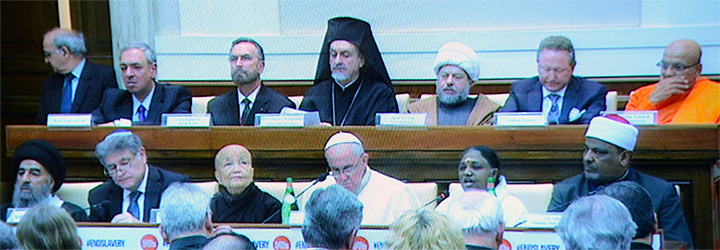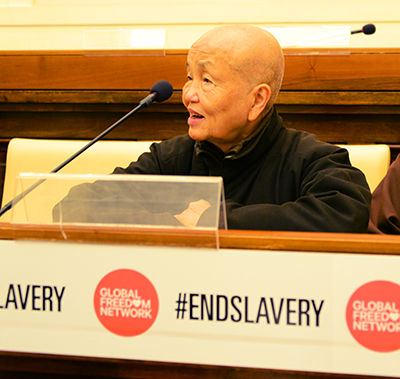savor
Mindful Eating, Mindful Life
savorthebook.com
Read More About
Mindful Eating
Mindful Living
Weight Loss
Exercise
Meditation
Joining Together to End Modern Slavery

We often think of “slavery” as a problem of the past—a memory only detailed in history books and films. Unfortunately, it’s anything but eradicated.
Right now, almost 36 million people are currently trapped in modern slavery—“the systematic deprivation of a person’s liberty, and abuse of his or her body.” The United Nations’ 2014 Global Report on Trafficking in Persons found a rise in child trafficking, especially girls, and that there is no place in the world where children, women, and men are safe from human trafficking. Whether it’s through forced labor, prostitution, or organ removal, modern slavery reaps a profit of around $150 billion per year.
Fortunately this serious problem is not going unnoticed. In fact, on this past Tuesday, December 2, leaders of the Buddhist, Hindu, Christian Catholic, Anglican and Orthodox, as well as Jewish and Muslim faiths joined together at the Vatican to sign a declaration to eradicate modern slavery and human trafficking.

Sr. Chan Khong (representing Thich Nhat Hanh, as Thay is still hospitalized), sat alongside Pope Francis and 11 other religious leaders to declare the common goal of eradicating modern slavery by 2020 throughout our world and for all time as a crime against humanity:
In the eyes of God, each human being is a free person, whether girl, boy, woman or man, and is destined to exist for the good of all in equality and fraternity…We pledge ourselves here today to do all in our power, within our faith communities and beyond, to work together for the freedom of all those who are enslaved and trafficked so that their future may be restored. Today we have the opportunity, awareness, wisdom, innovation and technology to achieve this human and moral imperative.
The landmark event serves as a powerful reminder of our interconnectedness, but as Thich Nhat Hanh emphasized in his powerful speech, “contemplation must go together with action:”
The world in which we live is globalized, and so too is this new form of slavery, that is connected to the economic, political and social systems. Therefore our ethics and morality also need to be globalized. A new global order calls for a new global ethic. We have to sit down together, as people of many traditions, as we are doing now, to find the causes of this suffering. If we look deeply together, with clarity, calm and peace, we will understand the causes of modern slavery, and we can find a way out.
So what can you do right now to help the cause? In this holiday season as you purchase gifts for friends and family, try and take the time to shop a bit more mindfully. Look deeper into the product you’re buying, finding out what you can about its source or production. Feel good about buying items that are created for a laborer’s benefit, rather than at their expense. Ending slavery for good is a challenging but attainable goal, but it is not only up to our world leaders—in different ways, we can all participate to make this a reality!
SAVOR: Mindful Eating, Mindful Life. Copyright © 2025 by Thich Nhat Hanh and Lilian Cheung. All Rights Reserved. Please review our terms of use
Website design
Mary Pomerantz Advertising




